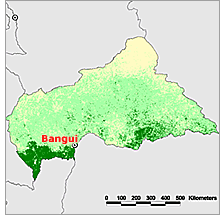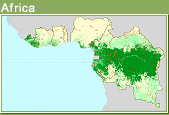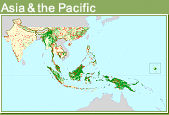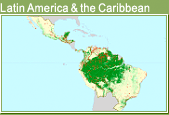Country details
Status of Tropical Forest Management 2005
Africa
Central African Republic

©UNEP-WCMC 2004
CAR possesses a substantial forest resource base in the south with a sizeable growing stock of high-value hardwood timber. Forest production provides important export revenues and contributes 5% or more to GDP. Two forest inventories have been carried out, the results of which can support forest management planning and economic analysis. In 1990, the country introduced a forest code that sets out social, environmental and silvicultural norms. However, there is a gap between the law and its implementation in the field.
Key points
- CAR has an estimated 3.80 million hectares of PFE, comprising 3.50 million hectares of natural production forest, 300,000 hectares of protection forest and 3,000 hectares of industrial timber plantations.
- At least 186,000 hectares (about 5%) of the natural-forest production PFE are under SFM. Insufficient data were available to estimate the area of protection PFE so managed.
- Commercial harvesting is carried out mostly by private entrepreneurs under management permits (Permis d'exploitation et d'aménagement), which are valid for the lifetime of the company.
- In mid 2005, ten timber companies, all foreign-owned, were operating in the southwest of the country in an area of 3.3 million hectares.
- A relatively small area of closed forest is contained in protected areas.
- There is little awareness in the private sector of the need for sustainable management, although such awareness may be growing as companies are obliged to develop forest management plans.
- The ministry in charge of forests, MEFCPET, generally lacks the capacity to oversee management of the PFE and to enforce the law, including sanctions when rules and regulations are infringed.
- The forest sector generates about 14% of state revenues.
- Wild meat and the gathering of edible fruits, nuts, insects and roots are of great importance for local communities.
- According to the forest law, a significant share of revenues generated by forest taxes is to be redistributed to local communities. However, such revenues are unevenly distributed between and within such communities.
- CAR is a landlocked country and the transport costs of exported timber are relatively high compared to those of other countries in the Congo Basin, limiting the profitability of SFM.

 Africa
Africa  Asia & the Pacific
Asia & the Pacific  Latin America & the Caribbean
Latin America & the Caribbean